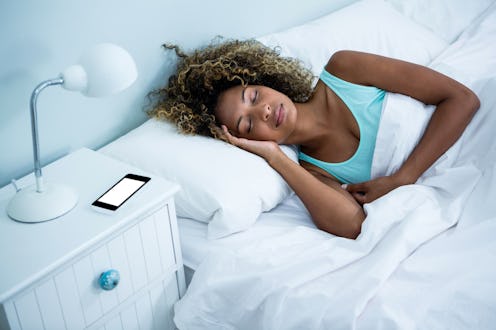Life
Headspace Just Launched New Guided Meditations To Help You Fall Asleep

There’s nothing worse than a night of tossing and turning when all you want to do is fall asleep. Troubled sleepers can rejoice: the popular wellness app Headspace wants to help you snooze in those moments when counting sheep just doesn’t cut it anymore. The mindfulness and meditation app launched a new feature this week that aims to help you get a better night’s rest. Sleep by Headspace features content designed specifically for the needs of restless sleepers — the screen is darker, the buttons are simpler to find, but the most intriguing update is the inclusion of new exercises dubbed “sleepcasts.”
Studies have explored the links between mindfulness exercises and sleep before. A 2015 study found that mindfulness meditation in older adults resulted in improvements in sleep quality, suggesting the practice could be used as a short-term solution for moderate sleep disturbances. In an article in Harvard Health Publishing, Dr. Herbert Benson, a cardiologist and professor of mind body medicine at Harvard Medical School, called mindfulness meditation "just one of a smorgasbord of techniques that evoke the relaxation response.”
Opening the Headspace app, there’s a small banner above the home button that spotlights the new feature. Click through, and the app welcomes you to “a new kind of sleep experience” that uses a mixture of visualization and sound to engineer optimal conditions for restful sleep. After setting your bedtime in the app, the indigo and purple-hued screen (darker to help with sleep) leads to a page filled with sleepcasts. Riffing off of podcasts, sleepcasts are described in the app as unique audio experiences that subtly change each night, so as not to bore users.
The problem with traditional sleep solutions like listening to a podcast or story, the company writes in a statement emailed to Bustle, is that these solutions often contain linear narratives. Sleepcasts, by contrast, are “long, non-storytelling narratives, each one describing a different landscape with its own unique sonic ambience.”
Testing prototypes with users led to the discovery that troubled sleepers are very sensitive to the passage of time, says Sarah Romotsky, Headspace's Health and Science Strategist. “We tested a linear narrative tour of a journey through the solar system, that went from the Sun to Pluto — but we found that people would be aware if they were still awake at Jupiter that they were running out of time to get to sleep, and that might cause them anxiety,” she explained. “Our idea was to create these descriptions that could be reshuffled, so a listener would not be able to use the content to judge the passage of time. One section might be at the beginning one night, in the middle the next, and at the end the next.”
Sleepcast options range from the traditional (Desert Campfire, which sounds like crickets and the nostalgic crackling fire you may remember from summer camp) to more unique soundscape options like Midnight Launderette, which features the gentle whirring of washing machines. Cat Marina, which sounds exactly how the name suggests, is a particularly unique highlight: “Perfect if you’re a fan of boats, or a fan of cats,” a smooth, lulling voice intones, “even better, if you happen to be a lover of both.”
The diversity of sleepcast options came from prototyping with users and a survey of the current research, says Romotsky. Natural sounds like the ocean were popular, but some people also found mechanical sounds more comforting, along with more fantastical and surreal sounds.
Soothing voices speak over the ambient sounds, narrating the specific experience and walking the user through calming exercises to help with sleep. Users can tailor the listening experience by toggling the voice-to-ambient-sound ratio, completely eliminating the voice or the background sounds to their preference. There’s also “Wind Downs,” guided exercises like deep breathing and visualization that help prep the body and mind for sleep. For people just looking for some comforting background noise to help them snooze, the “Sleep Sounds” section offers myriad choices: Forgotten shapes (synth beats that sound like a mellowed-out version of the Stranger Things soundtrack) and Pigeon radio (yes, 45 minutes of gentle pigeons cooing) are standouts.
Whatever your preference, there's plenty of options for every kind of sleeper to choose from. While the app won't cure insomnia, adding it to your nighttime routine may help you find sleep a little easier. At the very least, you can be entertained by the soft sounds of pigeons lulling you to sleep.